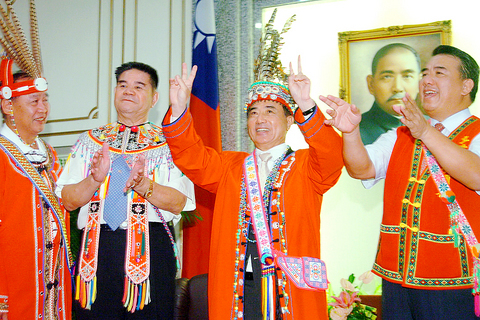Continuing the attack on Chinese Nationalist Party (KMT) chairmanship candidate Taipei Mayor Ma Ying-jeou (
Speaking at Wang's central chairmanship campaign headquarters yesterday morning, Chen said that about 80 percent of Ma's recent ads were directed at Lien, while 20 percent were directed at Wang.
With time running out before the KMT's chairmanship election on July 16, both Ma and Wang have intensified their campaigns for the party's top post. Rousing controversy within the party, the Ma camp's most recent television and print ads urge party members to draw a clear line at corrupt money practices, or "black gold," within the party by voting for him.

PHOTO: JIAN RONG-FENG, TAIPEI TIMES
Since the ads were released, the Wang camp has said that the ads indirectly smear Wang by implying that, in comparison to Ma, Wang has a history of corruption.
The Ma camp has consistently denied that the ads have any such meaning, while adding that Ma himself has also been the undeserved target of attack by members of the Wang camp.
In response to the outcry, Lien himself called on both camps to report on negative campaigning to the party's top policy body, its Central Standing Committee, next week.
Speaking yesterday, Chen said that it was obvious that the Ma camp's ads were directed at not only Wang, but also at Lien, by hinting that corruption still exists within the party.
"Everyone has been to school. Even thinking with your knee, the meaning is obvious," Chen said yesterday.
While Ma made no comment to Chen's remarks yesterday, Ma camp representative KMT Legislator Wu Yu-sheng (
However, hinted Wu, the Wang camp should stop its protests, otherwise the public might begin wondering how much of their outcry stems from a guilty conscience.
Besides heating up with an advertising campaign, both camps also geared up yesterday for this weekend's televised appearances by Wang and Ma.
The KMT has arranged for Wang and Ma to present their political views and vision for the party's future tomorrow and July 9. The first spots will be aired on five different television channels in their entirety this weekend.

Chinese spouse and influencer Guan Guan’s (關關) residency permit has been revoked for repeatedly posting pro-China videos that threaten national security, the National Immigration Agency confirmed today. Guan Guan has said many controversial statements in her videos posted to Douyin (抖音), including “the red flag will soon be painted all over Taiwan” and “Taiwan is an inseparable part of China,” and expressing hope for expedited reunification. The agency last year received multiple reports alleging that Guan Guan had advocated for armed reunification. After verifying the reports, the agency last month issued a notice requiring her to appear and explain her actions. Guan

GIVE AND TAKE: Blood demand continues to rise each year, while fewer young donors are available due to the nation’s falling birthrate, a doctor said Blood donors can redeem points earned from donations to obtain limited edition Formosan black bear travel mugs, the Kaohsiung Blood Center said yesterday, as it announced a goal of stocking 20,000 units of blood prior to the Lunar New Year. The last month of the lunar year is National Blood Donation Month, when local centers seek to stockpile blood for use during the Lunar New Year holiday. The blood demand in southern Taiwan — including Tainan and Kaohsiung, as well as Chiayi, Pingtung, Penghu and Taitung counties — is about 2,000 units per day, the center said. The donation campaign aims to boost

A preclearance service to facilitate entry for people traveling to select airports in Japan would be available from Thursday next week to Feb. 25 at Taiwan Taoyuan International Airport, Taoyuan International Airport Corp (TIAC) said on Tuesday. The service was first made available to Taiwanese travelers throughout the winter vacation of 2024 and during the Lunar New Year holiday. In addition to flights to the Japanese cities of Hakodate, Asahikawa, Akita, Sendai, Niigata, Okayama, Takamatsu, Kumamoto and Kagoshima, the service would be available to travelers to Kobe and Oita. The service can be accessed by passengers of 15 flight routes operated by

The Kaohsiung Tourism Bureau audited six hotels in an effort to prevent price gouging ahead of Korean band BTS’ concert tour in the city scheduled for Nov. 19, 21 and 22 this year. The bureau on Friday said that the audits — conducted in response to allegations of unfair pricing posted on social media — found no wrongdoing. These establishments included the local branches of Chateau de Chine, Hotel Nikko, My Humble House, and Grand Hai Lai, it said, adding that the Consumer Protection Commission would have penalized price gougers had the accusations been substantiated. The bureau said the Tourism Development Act